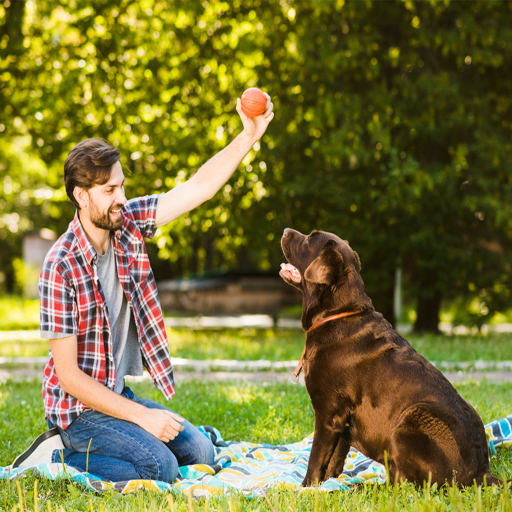Playing With My Dog: The Importance of Bonding Through Playtime
Are you a proud owner of a furry friend who loves nothing more than a good game of fetch or tug of war? Playing with your dog is not only fun but also essential for building a strong bond and promoting physical and mental well-being. In this article, we will explore the benefits of playtime, how to play with your dog, and answer some common questions about this beloved pastime.
Table of Contents
- Why Playtime is Important for Your Dog’s Health and Happiness
- Understanding Your Dog’s Play Style
- Different Types of Playtime Activities for Your Dog
- How Often Should You Play with Your Dog?
- Signs Your Dog Wants to Play and How to Respond
- What Happens if You Don’t Play with Your Dog?
- Do Dogs Get Bored of Playing?
- FAQs About Playing with Your Dog
1. Why Playtime is Important for Your Dog’s Health and Happiness
Playing with your dog is not only a fun way to spend time together, but it also has many health benefits. Regular playtime can help prevent obesity and other health issues by keeping your dog physically active. Additionally, playtime provides mental stimulation, which is crucial for preventing boredom and destructive behavior.
Furthermore, playtime is an excellent way to bond with your furry companion. It helps strengthen the relationship between you and your dog by promoting trust and mutual understanding. Playing with your dog also encourages socialization and can be an effective way to train your dog.
2. Understanding Your Dog’s Play Style
Before you can start playing with your dog, it’s important to understand their play style. Every dog has a unique personality, and what works for one dog may not work for another. Some dogs love chasing after a ball, while others prefer to play tug of war or wrestle.
Observe your dog’s behavior and determine what types of play they enjoy the most. This will help you create a playtime routine that is both fun and engaging for your dog.
3. Different Types of Playtime Activities for Your Dog
There are many different types of playtime activities that you can do with your dog, including:
- Fetch: This classic game involves throwing a ball or toy and having your dog retrieve it.
- Tug of War: A game of tug of war involves pulling on a toy with your dog.
- Hide and Seek: Hide a toy or treat and encourage your dog to find it.
- Puzzle Toys: These toys require your dog to solve a puzzle or manipulate objects to get a reward.
- Agility Training: This type of play involves setting up an obstacle course for your dog to navigate.
- Mix and match these activities to keep playtime exciting and engaging for your furry friend.
4. How Often Should You Play with Your Dog?
The frequency of playtime with your dog depends on several factors, including your dog’s age, breed, and energy level. However, as a general rule, it’s recommended to have at least two playtime sessions of 15-20 minutes each per day.
5. Signs Your Dog Wants to Play and How to Respond
It’s essential to be able to recognize when your dog wants to play. Some common signs that your dog wants to play include:
- Bringing you toys or nudging you with their nose
- Jumping up and down or wagging their tail excitedly
- Barking or making playful growling noises
When you notice these signs, it’s important to respond by initiating playtime. This will not only make your dog happy but also help strengthen your bond.
6. What Happens if You Don’t Play with Your Dog?
Failing to play with your dog can have negative consequences for their physical and mental health. Without regular playtime, dogs can become bored, restless, and even depressed. This can lead to destructive behaviors such as chewing, digging, and excessive barking.
Additionally, lack of physical activity can lead to obesity and other health issues, which can shorten your dog’s lifespan. Therefore, it’s essential to make playtime a regular part of your dog’s routine.
7. Do Dogs Get Bored of Playing?
Dogs, like humans, can get bored of doing the same activities repeatedly. Therefore, it’s essential to mix up your dog’s playtime routine to keep them engaged and interested. Introducing new toys, games, and activities can keep playtime exciting and prevent boredom.
8. FAQs About Playing with Your Dog
-
Is it good to play with your dog?
Yes, it’s essential to play with your dog as it promotes physical and mental well-being, strengthens your bond, and provides an opportunity for training and socialization.
-
Do dogs like it when you play with them?
Most dogs enjoy playing with their owners as it provides an opportunity to spend time together, exercise, and have fun.
-
Do I have to constantly play with my dog?
While it’s essential to make playtime a regular part of your dog’s routine, it’s not necessary to play with them constantly. Two playtime sessions of 15-20 minutes each per day are generally recommended.
-
How do you play with a dog like a dog?
To play with your dog like a dog, engage in activities that mimic their natural behavior, such as chasing, wrestling, and playing tug of war.
-
What happens if I don’t play with my dog?
Without regular playtime, dogs can become bored, restless, and even depressed. This can lead to destructive behaviors and health issues, which can shorten your dog’s lifespan.
Playing with your dog is not only fun but also essential for promoting their physical and mental well-being, strengthening your bond, and preventing destructive behaviors. By understanding your dog’s play style and incorporating different types of playtime activities, you can keep playtime exciting and engaging for both you and your furry friend. So grab your dog’s favorite toy and get ready to have some fun!
More Articles
Check out these videos
Contents
- 1 Playing With My Dog: The Importance of Bonding Through Playtime
- 2 Table of Contents
- 3 1. Why Playtime is Important for Your Dog’s Health and Happiness
- 4 2. Understanding Your Dog’s Play Style
- 5 3. Different Types of Playtime Activities for Your Dog
- 6 4. How Often Should You Play with Your Dog?
- 7 5. Signs Your Dog Wants to Play and How to Respond
- 8 6. What Happens if You Don’t Play with Your Dog?
- 9 7. Do Dogs Get Bored of Playing?
- 10 8. FAQs About Playing with Your Dog





